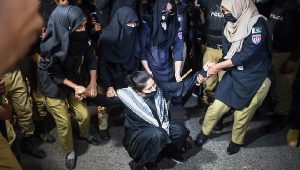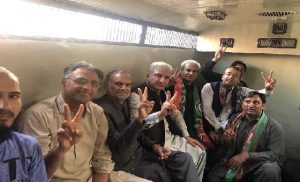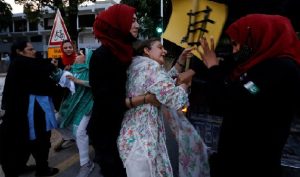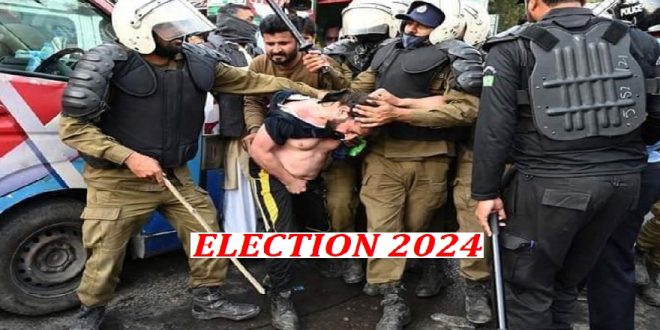05-02-2024
By SJA Jafri + Agencies + Bureau Report
 ISLAMABAD/ LAHORE: As per original sources, claims, historical facts, circumstances and challenges, the world’s only un-Islamic country on earth known as Islamic Republic of Pakistan has been facing “state terrorism” since its emergence while the minorities especially “Shia Community” have also been remaining not only under oppression of anti-Shia organizations but also the local, national and international terror groups including Taliban, al-Qaeda, Sipah-e-Sahaba, Lashkar-e-Jhangvi, Ehl-e-Sunnat Wal-Jamat, ISIS, Daesh and dozens of other anti-Shia clusters as well as individuals have been murdering, abducting, torturing, kidnapping, forcibly missing, abusing, intimidating, warning, threatening Shias including young boys & girls, men & women even aged community members & disable persons directly and with full support, facilitation and supervision of different governments, political & religious parties, LEAs and over 700,000 Shias have been martyred, missed, injured, detained, tortured and disabled temporary or permanently and in this connection like country’s previously history, the “State of Pakistan” directly doing ‘all’ which it has been doing like above against the Chief of Pakistan Tehreek-e-Insaf (PTI) and former Prime Minister (PM), Imran Khan, its leaders, former MPs, supporters, facilitators, financers, workers and now even the candidates of Elections-2024 that is scheduled on 8th February, that is being after the emergence of Pakistan in1947 till today as claimed by record holders, sources, aggrieved persons, victims and historical record.
ISLAMABAD/ LAHORE: As per original sources, claims, historical facts, circumstances and challenges, the world’s only un-Islamic country on earth known as Islamic Republic of Pakistan has been facing “state terrorism” since its emergence while the minorities especially “Shia Community” have also been remaining not only under oppression of anti-Shia organizations but also the local, national and international terror groups including Taliban, al-Qaeda, Sipah-e-Sahaba, Lashkar-e-Jhangvi, Ehl-e-Sunnat Wal-Jamat, ISIS, Daesh and dozens of other anti-Shia clusters as well as individuals have been murdering, abducting, torturing, kidnapping, forcibly missing, abusing, intimidating, warning, threatening Shias including young boys & girls, men & women even aged community members & disable persons directly and with full support, facilitation and supervision of different governments, political & religious parties, LEAs and over 700,000 Shias have been martyred, missed, injured, detained, tortured and disabled temporary or permanently and in this connection like country’s previously history, the “State of Pakistan” directly doing ‘all’ which it has been doing like above against the Chief of Pakistan Tehreek-e-Insaf (PTI) and former Prime Minister (PM), Imran Khan, its leaders, former MPs, supporters, facilitators, financers, workers and now even the candidates of Elections-2024 that is scheduled on 8th February, that is being after the emergence of Pakistan in1947 till today as claimed by record holders, sources, aggrieved persons, victims and historical record.
 On February 8, as Pakistan votes in national elections, the country’s democracy will face its latest test.
On February 8, as Pakistan votes in national elections, the country’s democracy will face its latest test.
It is an election that will decide the next government of the world’s fifth-most populous nation. Befittingly, it is also an election of large numbers, very large numbers.
From voters and parties to the economy and more, here’s a guide to Pakistan’s election and to the nation itself, in those numbers.
What’s the election about?
In all, 128 million people registered to vote in the elections to pick 266 representatives on February 8, forming the 16th parliament in a first-past-the-post system.
Pakistan is a country with 241 million people, of whom two-thirds are under the age of 30. A citizen becomes eligible to vote at the age of 18.
It is also a vast country, spanning mountainous terrain in its north, multiple deserts and a 990km (615 miles) coastline. On February 8, 90,582 polling stations will service voters who want to cast their ballots.
In the contest are 5,121 candidates. They belong either to Pakistan’s 167 registered political parties or are independents. The Pakistan Tehreek-e-Insaf (PTI) party of former Prime Minister Imran Khan has been barred from using its election symbol, the cricket bat, so its candidates will also be contesting as independents this time.
 Only a little more than half of Pakistan’s electorate voted in the 2018 elections.
Only a little more than half of Pakistan’s electorate voted in the 2018 elections.
With a crackdown against Khan’s party ongoing, it is unclear whether the February 8 elections will see a lower turnout, or a surge in the form of a silent protest vote in favor of PTI-aligned candidates.
How is the country doing?
The elections are taking place amid an ongoing economic crisis, with inflation running at almost 30 percent and a weakening currency, which has shed more than 50 percent of its value against the United States dollar in the last two years.
Meanwhile, the county entered into a nine-month $3bn bailout deal with the International Monetary Fund in July last year, which is set to expire around the same time as a new government will take oath.
In addition to these economic woes, attacks from armed factions have increased in past months adding to the instability of the country.
The struggling economy has allocated 243.6 million rupees ($850,000) for the cost of the elections, which many critics believe has effectively been engineered to keep Khan out of power and instead usher in a leader the military is comfortable with.
Pakistan’s powerful military establishment has ruled the country directly for more than three decades of its independent history.
 It is the most powerful institute in the country: 12.5 percent of the government budget goes towards military spending, according to government documents.
It is the most powerful institute in the country: 12.5 percent of the government budget goes towards military spending, according to government documents.
The run-up to the poll has seen Khan sentenced to jail in at least three different cases, and former Prime Minister Nawaz Sharif who was previously jailed and then in exile return and emerge as a leading contender again.
While the economy is teetering, Pakistan is also on edge on the security front, amid heightened tensions with three out of its four neighbors.
Internally, there has been a dramatic surge in violence, while marginalized communities, geographically as well as religiously, have accused the state of mounting persecution.
With a deeply polarized society and uncertainty about the future, many see this election as a referendum on the military’s involvement in politics.
Of the 128 million voters, the largest number 44 percent are below the age of 35, making the youth vote critical in these elections.
The second largest group of voters are between the ages of 36 and 45, constituting 22.3 percent of the electorate.
Women form 46 percent (59.3 million) and men 54 percent (69.2 million) of the registered voters.
More than 5,000 candidates are contesting for 266 seats, and among them are 4,806 men, 312 women and two transgender people.
 Pressmediaofindia
Pressmediaofindia




